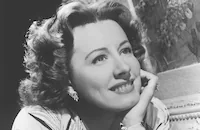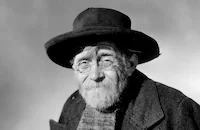No Other Woman

Brief Synopsis
Cast & Crew
J. Walter Ruben
Irene Dunne
Charles Bickford
Gwili Andre
Eric Linden
Christian Rub
Film Details
Technical Specs

Synopsis
In a Pennsylvania steel town, Big Jim Stanley works hard in the mill, while his new wife Anna runs a boardinghouse and carefully saves their earnings. When Joe Zarcovia, one of Anna's boarders, invents a special dye, Anna asks Jim if they can use their savings to invest in Joe's discovery. Upset by Anna's insistence that they improve their lives and leave the mill, Joe refuses Anna's request and storms out of the house. Later, as Anna watches through the window, Joe stumbles home drunk with a strange woman. The next morning, however, Joe begs Anna's forgiveness and agrees to invest in Joe's dye. Boosted by the Stanleys' money, Joe's invention becomes a great success, and both he and Jim make a fortune as dye manufacturers. Many years later, the now wealthy Jim, who has bought out several steel mills, meets and falls in love with New York gold digger Margot Van Dearing. When Margot threatens to leave Jim unless he marries her, Jim asks Anna for a divorce. Although hurt by Jim's infidelity, Anna refuses to grant his wish, convinced that his infatuation with Margot is only temporary. Desperate, Jim sues Anna for divorce, and during the subsequent trial, several Stanley employees testify that Anna spent the night with another man. In spite of Anna's claims that she still loves Jim and is innocent, Jim wins the decision. When the judge announces that Anna will lose custody of her son Bobbie, however, she "confesses" to the adultery and demands to keep Bobbie. Overwhelmed by Anna's bravery, Jim reveals that he paid the witnesses to lie and is sent to prison for perjury. After he is released from jail a year later, Jim, whose steel and dye stocks have crashed, returns to the mill but, out of shame, hides from Anna. Anna finds him, however, and convinces him to return to his loving home.

Director
J. Walter Ruben
Cast

Irene Dunne

Charles Bickford

Gwili Andre

Eric Linden

Christian Rub

Leila Bennett

J. Carrol Naish
Buster Miles
Hilda Vaughn
Joseph E. Bernard
Frederick Burton
Theodore Von Eltz
Edwin Stanley
Brooks Benedict
Crew
James Anderson
Joe Biroc
Carroll Clark
Edward Cronjager
George Diskant
Owen Francis
William Hamilton
John Miehle
Clem Portman
Bernard Schubert
David O. Selznick
Max Steiner
Wanda Tuchock
Slavko Vorkapich

Film Details
Technical Specs

Articles
No Other Woman
Produced by David O. Selznick, No Other Woman tells the rags-to-riches-and-back-to-rags-again story of a mill owner (Charles Bickford) and his dutiful wife (played by Dunne) whose marriage is torn apart by a gold digger (Gwili Andre). When Dunne's character refuses to grant her husband a divorce, certain that it's just an infatuation that will run its course, her husband sues her and pays his employees to lie on the stand that Dunne was having an affair. While the accusations are untrue, Dunne "confesses" when she is threatened with losing custody of her son.
Based on the 1916 play Just a Woman by Eugene Walter which ran for 136 performances, it had been originally filmed as a silent in 1925 when Irving Cummings directed Claire Windsor and Conway Tearle for First National Pictures. The 1933 version would star Dunne and Bickford with support from Andre, Eric Linden and old reliable J. Carrol Naish as the evil attorney. Production began in early October 1932 and wrapped up on January 6, 1933.
At only 58 minutes, No Other Woman was shorter than the average "A" picture, but its brevity did not spare it negative reviews like Mordaunt Hall's from the January 30, 1933 New York Times unfortunately entitled "Irene Dunne and Charles Bickford in a Film Version of Eugene Walter's Old Play, Just a Woman". In it, Hall writes "even though there has been an effort to bring the story up to date and the leading players do all that is virtually possible with their roles, the pictorial translation of Eugene Walter's old play, Just a Woman which is now at the RKO Rosy under the title of No Other Woman, scarcely does credit to the playwright who wrote Paid in Full and The Easiest Way and who has also been responsible for several excellent film adaptations. J. Walter Ruben's direction is un-imaginative and the script from which he had to work is dull. As the narrative comes to the screen it lacks suspense and where it might be reasonably dramatic it is hopelessly implausible.[...]In one episode Anna becomes aware that she is a subject of gossip among other women. This dawns upon her while she is at the golf club and the anxiety she feels about her husband does not interfere with her golf, for she makes an excellent drive and then a pretty long putt. She is probably one of the few players who are not put off their game by worry. She hurries from the golf links to the train and goes to New York with the hope of bringing her husband to his senses. Miss Dunne's role is a thankless one, but she is attractive and sincere in the acting of it. Mr. Bickford likewise struggles valiantly with his part. Miss Andre is not especially impressive in her role and Eric Linden as Joe is merely acceptable."
Producer: David O. Selznick
Director: J. Walter Ruben
Screenplay: Wanda Tuchock, Bernard Schubert, Owen Francis, Eugene Walter (play)
Cinematography: Edward Cronjager
Film Editing: William Hamilton
Art Direction: Carroll Clark
Music: Max Steiner
Cast: Irene Dunne (Anna Stanley), Charles Bickford (James Stanley), Gwili Andre (Margot Van Dearing), Eric Linden (Joe Zarcovia), Christian Rub (Eli Bogavitch), Leila Bennett (Susie Bogavitch).
BW-58m. Closed captioning.
by Lorraine LoBianco
SOURCES:
Wikipedia.org
The New York Times "Irene Dunne and Charles Bickford in a Film Version of Eugene Walter's Old Play, Just a Woman " by Mordaunt Hall, January 30, 1933
The American Film Institute Catalog
The Internet Movie Database

No Other Woman
Quotes
Trivia
The original play, "Just a Woman," opened in New York City, New York, USA on 17 January 1916 and had 136 performances.
Notes
The working titles of this film were Man and Wife and Just a Woman. According to a Film Daily news item, Owen Francis, who is listed as story writer in copyright records, also worked on the screenplay of the picture with credited writer Wanda Tuchock. Film Daily news items add Mary Mason, Sandra Shaw, Eleanor Post, Phyllis Fraser, Betty Furness and Charles Middleton to the cast, but their participation in the final film has not been confirmed. In 1925, Irving Cummings directed Claire Windsor and Conway Tearle in a First National production of Eugene Walter's play (see AFI Catalog of Feature Films, 1921-30; F2.2830).














